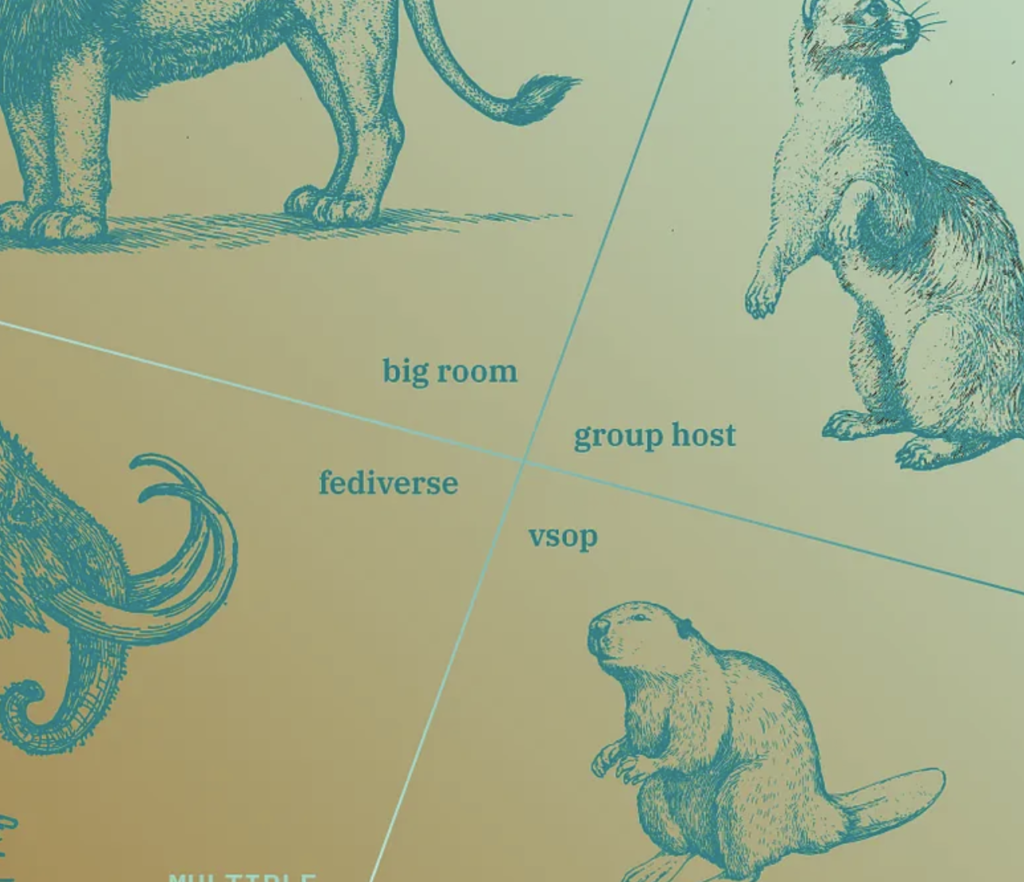It’s been a good winter for writing… or in some cases, a good winter for writing I did months ago to see the light of day. Here’s a few pieces I’m especially proud of and which may be of interest to you, depending on whether you follow me for insights on social media or just for the wedding photos.
A Social Network Taxonomy: Is Mastodon a replacement for Twitter or something entirely different? That’s a surprisingly complicated question. Looking for an answer, and talking with friend Tom Tyler, Tracey Meares, Eli Pariser and Deepti Doshi, I found myself playing with some new ways to characterize social networks: Do they feel like they are a single room, or many separate rooms? And are they controlled by one person, or do many people have control?
What results is a 2×2 matrix which gives a simple way to talk about some of the complexities of governing and moderating social media. And better language to talk about social media is a step away from fixing existing models of social media and towards embracing a pluriverse of social media where different communities work differently for different purposes: A Social Media Taxonomy
In a real sense, this piece is an extension of what Chand Rajendra-Nicolucci and I started doing with An Illustrated Field Guide to Social Media. We’re hoping to revise and reissue the book in the next year – we’re talking with a publisher about a new print edition and an online edition that gets revised over time. In the meantime, your best bet is the edition hosted by the Knight First Amendment Institute.
Creating PublicSpaces: My friend Geert-Jan Bogaerts is the CTO of one of the Netherland’s public broadcasters, VPRO. A few years ago, he realized that he was in a bit of a moral quandry: tools he needed to use, like Google Analytics, conflicted with the values of his organization, notably values around user autonomy and independence. Can we justify putting users under surveillance so we can measure how effective our programming is? Is it wise to push people towards corporate controlled spaces like Facebook to have conversations about Dutch public broadcasting?
GJ ended up co-founding a collective of Dutch broadcasters and cultural organizations, who took on the work of auditing their software use and identifying tools that came into conflict with their values. With José Van Dijck, we wrote up the PublicSpaces origin story, and investigate whether the model of aligning software with the principles of “values-led organizations” might create a new market for open source and socially responsible software. (Needless to say, this has important implications for social media platforms.) We believe values-led organizations in Europe might be the next leaders of a movement towards software we can feel good about and tools we have a role in governing: Creating Public Spaces
How social media could teach us to be better citizens: In 1995, social scientist Robert Putnam suggested that American civic life was weakening because people were retreating from public spaces. Putnam’s critique, expanded in his book Bowling Alone, is often cited by people arguing that online interactions are weakening American society. But there’s an intriguing possibility: local organizations from bowling leagues to men’s lodges, Putnam believed, were helping train citizens in the mechanics of civics. People learn to run meetings, to find agreement, to argue respectfully and helpfully.
Could we gain some of these same lessons from participating online? Probably not, unless we are involved in the actual governance of online spaces. If we consider communities like Reddit, where individuals are invited to moderate communities, perhaps there is a path towards rebuilding civic skills through online spaces. This paper is the beginning of a larger argument I’m hoping to make, which argues that the public sphere includes places to find news, places to discuss that news, and tools that help train us in civic participation: How social media could teach us to be better citizens

In addition to these academic (and academic-adjacent) articles, I’m continuing to write a monthly column for Prospect (UK) about whatever catches my eye in the tech world. There’s about a month’s turnaround from when I start writing to when these run online, so they can seem a bit behind the curve sometimes, particularly around crazy-fast issues like the collapse of Twitter. The articles are all linked here and my next article, on ChatGPT and propaganda is coming soon.
Thanks for reading!